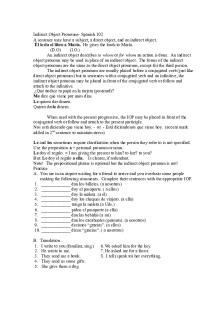Indirect Object Pronouns PDF

| Title | Indirect Object Pronouns |
|---|---|
| Course | Introductory Italian |
| Institution | University of Alabama |
| Pages | 2 |
| File Size | 72.5 KB |
| File Type | |
| Total Downloads | 108 |
| Total Views | 145 |
Summary
Professor Lucia...
Description
an indirect object differs from a direct object in that the action of the verb affects it indirectly, the action of the verb is done to or for the indirect object o compare direct object: I brought the book indirect object: I brought my sister the book. indirect object: I brought the book to my sister. indirect object: I brought the book for my sister. o an indirect object answers the question “to/for whom?”; in English, an indirect object may either sand alone or be introduced by to/for; in Italian, the indirect object noun is always introduced by a/per; the indirect object is always introduced be a/per indirect object pronouns differ from direct object pronouns only in the third-person singular/plural forms --1st person 2nd person 3rd person 3rd person 3rd person o
o
o
SINGULAR mi ti gli le Le
--to me to you to him to her to you (formal)
PLURAL ci vi loro (gli)
--to us to you all to them
Loro
to you all (formal)
indirect object pronouns normally precede a conjugated verb (except for loro/Loro which follow the verb) examples Non le danno molti soldi come cameriera. (They don’t give her much money as a waitress.) Gli ho offerto un caffè. (I offered him a cup of coffee.) in contemporary usage, loro is often replaced with gli (which precedes the verb) Quando parliamo loro? (When shall we speak to them?) Quando gli parliamo? (When shall we speak to them?) with the exception of loro, indirect object pronouns governed by an infinitive normally follow the infinitive and are attached to it; the infinitive drops the final “-e” examples Ho bisogno di parlarLe. (I need to talk to you.) Preferiamo non dirti niente. (We prefer not to tell you anything.) Perché’ avete deciso di non scrivere loro? (Why did you decide not to write to them?) if the infinitive is governed by the verb dovere, potere, or volere, the pronoun may either be attached to the infinitive or precede the entire verb phrase Posso parlarLe? (May I talk to you?) Le posso parlare? (May I talk to you?) Non dobbiamo rispondergli. (We mustn’t answer him.) Non gli dobbiamo rispondere. (We mustn’t answer him.) when the verb is in a compound tense and an object pronoun precedes it, it’s important to know whether the object pronoun is direct/indirect in order to use the correct form
o
of the past participle; the past participle can agree with the preceding direct object pronoun; it never agrees with a preceding indirect object pronoun Patrizia? L’ho vista ieri ma non le ho parlato. (Patricia? I saw her yesterday, but I didn’t speak to her.) some Italian verbs take an indirect object when their English equivalents take a direct examples Telefono a Mario per la cena. (I am calling Mario for dinner.) Gli telefono adesso. (I am calling him now.) the most common of these verbs are… bastare (to suffice; to last) chiedere (to ask) domandare (to ask) dire (to tell) dispiacere (to be sorry) fare bene (to be good for) fare male (to be bad for; to hurt) piacere (to please) rispondere (to answer) somigliare (to resemble; to be like) assomigliare (to resemble; to be like) rassomigliare (to resemble; to be like) telefonare (to phone) volere bene (to love) Signora, chi Le ha risposto? Non accettiamo le prenotazioni in questo ristorante. (Ma’am, who answered you? We don’t accept reservations at this restaurant.) Il fumo gli fa male. (Smoking is bad for him.) Telefonate agli amici; telefonate loro (gli telefonate) ogni giorno. (You call your friends; you call them everyday.) Somiglio a mia madre; le somiglio nel naso. (I resemble my mother; my nose is like hers)...
Similar Free PDFs

Indirect Object Pronouns
- 1 Pages

Indirect Object Pronouns
- 2 Pages

The Indirect Object essay
- 7 Pages

Subject Pronouns
- 1 Pages

Indirect realism essay
- 3 Pages

Grammar 3.1.2 Indirect Questions
- 8 Pages

Logic 19 Conditional Indirect
- 3 Pages

Possessive Pronouns Le Mien
- 2 Pages
Popular Institutions
- Tinajero National High School - Annex
- Politeknik Caltex Riau
- Yokohama City University
- SGT University
- University of Al-Qadisiyah
- Divine Word College of Vigan
- Techniek College Rotterdam
- Universidade de Santiago
- Universiti Teknologi MARA Cawangan Johor Kampus Pasir Gudang
- Poltekkes Kemenkes Yogyakarta
- Baguio City National High School
- Colegio san marcos
- preparatoria uno
- Centro de Bachillerato Tecnológico Industrial y de Servicios No. 107
- Dalian Maritime University
- Quang Trung Secondary School
- Colegio Tecnológico en Informática
- Corporación Regional de Educación Superior
- Grupo CEDVA
- Dar Al Uloom University
- Centro de Estudios Preuniversitarios de la Universidad Nacional de Ingeniería
- 上智大学
- Aakash International School, Nuna Majara
- San Felipe Neri Catholic School
- Kang Chiao International School - New Taipei City
- Misamis Occidental National High School
- Institución Educativa Escuela Normal Juan Ladrilleros
- Kolehiyo ng Pantukan
- Batanes State College
- Instituto Continental
- Sekolah Menengah Kejuruan Kesehatan Kaltara (Tarakan)
- Colegio de La Inmaculada Concepcion - Cebu







